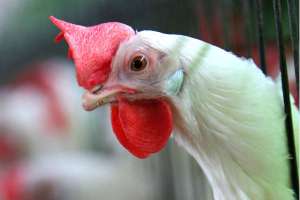
David Silverman / Getty Images News
The corporate food system in America has come under intense pressure in recent years over its environmental and humanitarian standards—most recently when a pork producer in Iowa was filmed by undercover allegedly abusing its animals, as my colleague Alexandra Silver wrote about recently. Usually industrial producers and green groups are at each others’ throats, fighting a battle that’s as much a culture war as it is a dispute over how we should raise our food. There’s rarely room for compromise.
That’s why it was so stunning earlier today to see the Humane Society of the United States and the United Egg Producers (UEP) announce that they would jointly petition Congress for new laws that would require the commercial egg industry to provide hens with better living conditions. They aim to have the new law implemented by June and eventually adopted by the entire industry by 2029. Said Wayne Pacelle, president of the Human Society:
It is always our greatest hope to find common ground and to forge solutions, even with traditional adversaries. We are excited about a new and better pathway forward and hope the Congress seizes the opportunity to embrace this sort of collaboration and mutual understanding.
Said Bob Krouse, the head of the UEP and an Indiana egg farmer himself (PDF):
We are committed to working together for the good of the hens in our care and believe a national standard is far superior than a patchwork of state laws and regulations that would be cumbersome for our customers and confusing to consumers.
(More from TIME: Getting Real About the High Price of Cheap Food)
The proposed legislation that the Humane Society and UEP are supporting—if it were passed by Congress—would essentially do away with the battery cages for egg-laying hens, cages that have always been a target of the animal rights movement. Up to 10 hens can be stuffed into the tiny wire cages, with perhaps 48 sq. in per hen—not enough space to raise their wings, or really to do anything beyond breathing and defecating and laying eggs. That could end with the new law, as Bruce Friedrich of Farm Sanctuary describes in the Huffington Post:
The legislation supported by the UEP will: 1) require the eventual nationwide elimination of battery cages; 2) require environmental enrichment for all birds so that they can engage in important natural behaviors currently denied to them in barren cages; 3) mandate labeling on all egg cartons nationwide to inform consumers of the method used to produce the eggs; 4) prohibit forced molting through starvation — an inhumane practice which is inflicted on tens of millions of hens each year and which involves withholding all food from birds for up to two weeks in order to shock their bodies into another laying cycle; 5) prohibit excessive ammonia levels in henhouses — a common problem in the industry that is harmful to both hens and egg industry workers; 6) require standards for euthanasia practices; and 7) prohibit the sale of all eggs and egg products nationwide that don’t meet these requirements.
(Photos from TIME: From Farm to Fork)
This agreement is truly remarkable—the Humane Society, and other animal rights groups, have been fighting state by state to get battery cages banned. They’ve had success—in 2008 California passed a ballot initiative on the issue that received more “yes” votes than any other initiative in the state’s history, and similar campaigns were on target in Washington state and Oregon. Rather than fight those attacks state by state, it looks like the egg industry had decided it would be better to compromise now—and to its credit, the Humane Society agreed.
Of course, this agreement changes little on the ground until legislation is passed—and we all know how hard it is for Congress to come together on anything these days, let alone on a hot button issue like animal rights and food production. The Pork Producers Council has already come out against the proposed law, arguing that it would “set a dangerous precedent for allowing the federal government to dictate how livestock and poultry producers raise and care for their animals.” Overhauling the entire egg industry could cost some $4 billion—and at least some of those costs will likely be passed onto consumers. If enacted, the bill would be the first federal law improving the treatment of farmed animals in more than 30 years, which should give you an idea of just how much of an uphill fight its supporters face.
Don’t expect them to back down from a fight, however. Over the past decade the curtain has been lifted on industrial food production—and many Americans don’t like what they see. The food system is changing for the better—or at least the more humane—and today’s announcement is a major step forward.
(More from TIME: Want to Make More Than a Banker? Become a Farmer!)
Bryan Walsh is a senior writer at TIME. Find him on Twitter at @bryanrwalsh. You can also continue the discussion on TIME’s Facebook page and on Twitter at @TIME.


